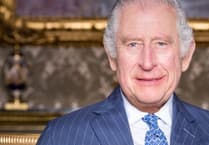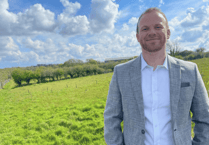Hopes of a balmy summer’s evening of open air theatre were dashed when just before the play began there was torrential rain. Ironically, during the first half hour the audience had to shield their eyes from the setting sun behind the canvas pyramid of a stage until more rain followed. But the audience of more than a hundred were made of sterner stuff and having come prepared with protective clothing and umbrellas were rewarded with a highly entertaining and fun filled adventure.
Set in 1930s London and the undiscovered land of Halcyon the play was written and directed by Bill Scott with an original jazzy score by Tom Adam. It tells the story of Ruth (Rose Mcphilemy) a spirited young explorer and botanist at the British Museum who invites Timothy (Ben Kernow) of the Museum Geology department, to join her on an adventurous journey and solve the ‘Story of the Stones’. They are accompanied by a team of quarrelsome explorers: Grough ‘Bully’ Barker (Benjamin Dyson), the Rev Hector ‘Foggy’ Fogg (Hannah Stephens) and Archie MacMacintosh (Daniel Richards), a red-headed Scotsman in a kilt with an English accent. With a cry of ‘concordia superabilis’ [agreement can overcome] Foggy and Mac dance the Charleston, then off they all go on an action-packed adventure through undiscovered lands.
With superb acting and rollicking fun the cast of five play several characters when the story eventually moves to Halcyon, a distant tranquil paradise of exotic plant specimens. There they encounter the inhabitants, dressed in multi-coloured lampshade-shaped bell dresses and tall basket hats, who seemingly lead entirely peaceful and contented lives. The Mighty Empress tells them she governs an empire of 25,425 people living in a perfect world.
Despite the boisterous fun of the adventure, serious questions are posed on the concept of Utopia. Have the explorers discovered the best of all possible worlds or is it all too good to be true?
In the programme Bill Scott writes: “Everyone has at some time wanted the world to be a better place. The idea of Utopia feeds that universal longing, but invariably contains the seeds of the very things it seeks to eliminate.”
He ends by asking the audience to consider what liberties they would give up in exchange for a trouble-free and secure life.





Comments
This article has no comments yet. Be the first to leave a comment.